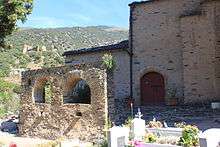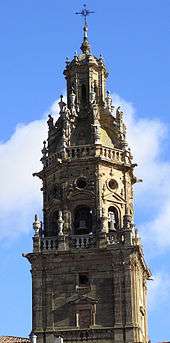Conjuratory
A conjuratory or exconjuratory (Aragonese: esconchurador, Catalan: comunidor, Spanish: conjuratorio) is a small religious building from which ceremonies were conducted to bless the fields and ward off calamities caused by the weather, like storms, hail and excessive rain that could ruin the harvests. Usually these buildings are attached to a church building or a hermitage.
Exconjuratories were common in the ancient villages of the Pre-Pyrenees and the Pyrenees, especially in Aragon.[1]
Description
Exconjuratories were usually built in a symmetrical way, with large windows open to the four cardinal points.[1]
In some places the exconjuratory is part of the bell tower of a church. On the fourth floor of the main tower of the Cathedral of Murcia there are four conjuratories. Located in each corner, special ceremonies were conducted in them by priests to ward off storms that could spoil the harvest in the fields by means of the Lignum Crucis kept in the cathedral. Other towns in the Region of Murcia like Cieza, had conjuratories as well.[2] Conjuratories could also be used to ward off other non-weather-related catastrophical events afflicting the community, like epidemics and crop-damaging pests, like locusts.[3]
They fell into disuse centuries ago and many of the exconjuratories that have survived are in a ruined state.[4]
Rituals
The Tentenublo[5] (in Spanish) is an example of the prayers conducted in special occasions within the conjuratories:
|
|
Gallery

- Exconjuratory in Asín de Broto, Aragon
- Interior of the exconjuratory in Asin de Broto
 Exconjuratory at Pallerols, Ports de Beseit, close to La Sénia
Exconjuratory at Pallerols, Ports de Beseit, close to La Sénia Cathedral of Murcia bell tower showing the conjuratories located in the corners of the third tier
Cathedral of Murcia bell tower showing the conjuratories located in the corners of the third tier- The church of El Pueyo de Araguás has a conjuratory up in the bell tower
 The Santo Tomás parish church in Haro, La Rioja also has a conjuratory in its bell tower
The Santo Tomás parish church in Haro, La Rioja also has a conjuratory in its bell tower
References
External links
| Wikimedia Commons has media related to Conjuratory. |
- Esconchurador d'a Cruz Blanca (Spanish)
- Hiking Route, including images and references about Exconjuratories
- Concatedral de Santa María de La Redonda - Logroño
- "Esconjuradero" label in Flickr
- Carmen Gozalo de Andrés, Meteorología popular: Acordarse de Santa Bárbara cuando truena